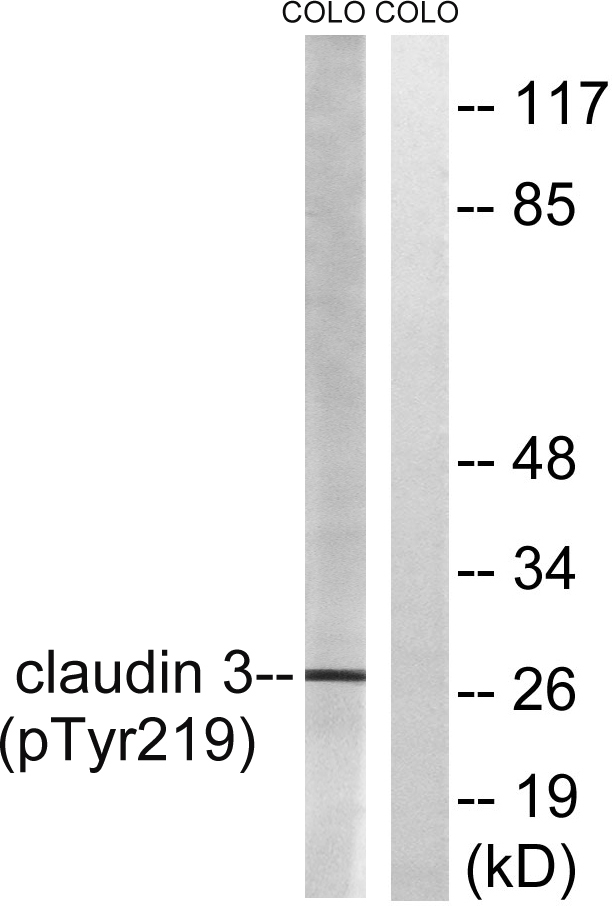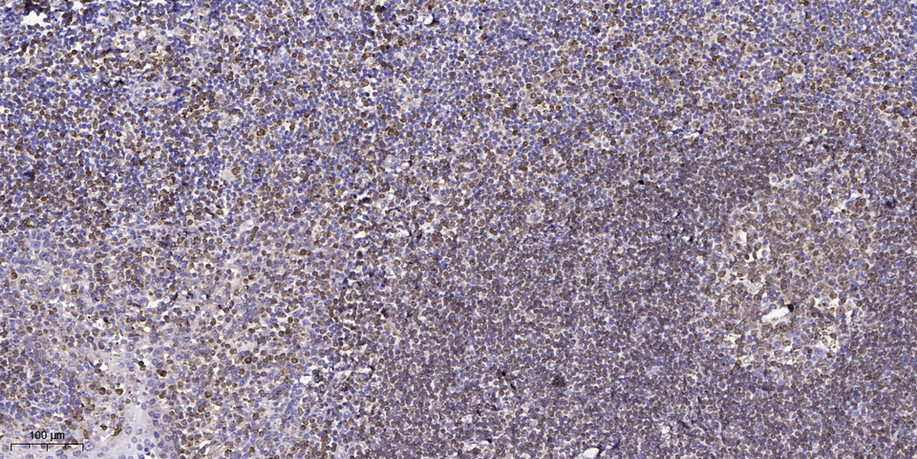Claudin-3 (phospho Tyr219) Polyclonal Antibody
- Catalog No.:YP0464
- Applications:WB;IHC;IF;ELISA
- Reactivity:Human;Rat;Mouse;
- Target:
- Claudin 3
- Fields:
- >>Cell adhesion molecules;>>Tight junction;>>Leukocyte transendothelial migration;>>Pathogenic Escherichia coli infection;>>Hepatitis C
- Gene Name:
- CLDN3
- Protein Name:
- Claudin-3
- Human Gene Id:
- 1365
- Human Swiss Prot No:
- O15551
- Mouse Swiss Prot No:
- Q9Z0G9
- Immunogen:
- The antiserum was produced against synthesized peptide derived from human Claudin 3 around the phosphorylation site of Tyr219. AA range:171-220
- Specificity:
- Phospho-Claudin-3 (Y219) Polyclonal Antibody detects endogenous levels of Claudin-3 protein only when phosphorylated at Y219.
- Formulation:
- Liquid in PBS containing 50% glycerol, 0.5% BSA and 0.02% sodium azide.
- Source:
- Polyclonal, Rabbit,IgG
- Dilution:
- WB 1:500 - 1:2000. IHC 1:100 - 1:300. ELISA: 1:5000.. IF 1:50-200
- Purification:
- The antibody was affinity-purified from rabbit antiserum by affinity-chromatography using epitope-specific immunogen.
- Concentration:
- 1 mg/ml
- Storage Stability:
- -15°C to -25°C/1 year(Do not lower than -25°C)
- Other Name:
- CLDN3;C7orf1;CPETR2;Claudin-3;Clostridium perfringens enterotoxin receptor 2;CPE-R 2;CPE-receptor 2;Rat ventral prostate.1 protein homolog;hRVP1
- Observed Band(KD):
- 28kD
- Background:
- Tight junctions represent one mode of cell-to-cell adhesion in epithelial or endothelial cell sheets, forming continuous seals around cells and serving as a physical barrier to prevent solutes and water from passing freely through the paracellular space. These junctions are comprised of sets of continuous networking strands in the outwardly facing cytoplasmic leaflet, with complementary grooves in the inwardly facing extracytoplasmic leaflet. The protein encoded by this intronless gene, a member of the claudin family, is an integral membrane protein and a component of tight junction strands. It is also a low-affinity receptor for Clostridium perfringens enterotoxin, and shares aa sequence similarity with a putative apoptosis-related protein found in rat. [provided by RefSeq, Jul 2008],
- Function:
- disease:Haploinsufficiency of CLDN3 may be the cause of certain cardiovascular and musculo-skeletal abnormalities observed in Williams-Beuren syndrome (WBS), a rare developmental disorder. It is a contiguous gene deletion syndrome involving genes from chromosome band 7q11.23.,function:Plays a major role in tight junction-specific obliteration of the intercellular space, through calcium-independent cell-adhesion activity.,similarity:Belongs to the claudin family.,subunit:Can form homo- and heteropolymers with other CLDN. Homopolymers interact with CLDN1 and CLDN2 homopolymers. Directly interacts with TJP1/ZO-1, TJP2/ZO-2 and TJP3/ZO-3.,
- Subcellular Location:
- Cell junction, tight junction . Cell membrane ; Multi-pass membrane protein .
- Expression:
- Colon,Salivary gland,
- June 19-2018
- WESTERN IMMUNOBLOTTING PROTOCOL
- June 19-2018
- IMMUNOHISTOCHEMISTRY-PARAFFIN PROTOCOL
- June 19-2018
- IMMUNOFLUORESCENCE PROTOCOL
- September 08-2020
- FLOW-CYTOMEYRT-PROTOCOL
- May 20-2022
- Cell-Based ELISA│解您多样本WB检测之困扰
- July 13-2018
- CELL-BASED-ELISA-PROTOCOL-FOR-ACETYL-PROTEIN
- July 13-2018
- CELL-BASED-ELISA-PROTOCOL-FOR-PHOSPHO-PROTEIN
- July 13-2018
- Antibody-FAQs
- Products Images

- Western blot analysis of lysates from COLO205 cells treated with EGF 200ng/ml 30', using Claudin 3 (Phospho-Tyr219) Antibody. The lane on the right is blocked with the phospho peptide.

- Immunohistochemical analysis of paraffin-embedded human tonsil. 1, Antibody was diluted at 1:200(4° overnight). 2, Tris-EDTA,pH9.0 was used for antigen retrieval. 3,Secondary antibody was diluted at 1:200(room temperature, 45min).



